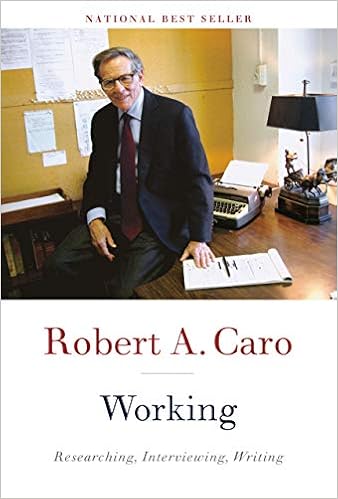Navigating Power
by Susan diRende
I ended the year listening to a standout memoir read by the author, Working by Robert Caro. Instead of aiming to tell the story of a life as he does in his biographies, this book focuses exclusively on Caro’s evolution and process as a writer. Caro the human being appears, but more as if seen through a window into what it takes for a person to live and work with absolute integrity. I found myself admiring him and his wife immensely.
I chose to read Working because it was a writer’s memoir. Hearing Caro’s voice, his easygoing, conversational tone colored with a New York accent, as I walked the dog made me feel like he was joining me on the stroll. His stories captivated me. His outrage and his admiration became mine.
But it was the political world he had to navigate in order to write his enormous biographies of Robert Moses and Lyndon Johnson that brought me unexpected solace given the political climate today. I understood how he could have both empathy and even pity for these political giants whose accomplishments were overshadowed by their disregard for the ordinary people whose lives they carelessly destroyed. Moses, for example, exercised unchallenged power in his domain for 40 years, and yet he ultimately lost it all. And Johnson, who got so much landmark Civil Rights and social services legislation passed, didn’t even bother to run for a second term because of Vietnam.
What struck me again and again was how power became the point for players in the political arena and not the virtues or service, not the ideals of the republic, not the people themselves. When I hold the lens of the world of Caro’s research up to the political world today, I see less of a catastrophe and more of an ongoing battle that requires constant struggle. I see that I mistakenly thought fairness, justice, and progress had been woven into the system instead of being delicate stitchery easily torn without constant attention and care.
And of course, one avenue of that attention is exemplified by Caro himself. His unfailing rigor in researching and supporting every fact. His determination to make the people around the central figures and those far away but affected by their actions all come to life in the awful complexity of the social fabric. His clarity that writing matters.
Susan diRende ran away from college and joined the circus at 20, where
she learned how to step outside the boundaries just far enough to get a
laugh. Ever since then, she has been writing, painting, performing, and
directing with the goal of bringing about illumination and
transformation through laughter. She has won awards as a playwright,
screenwriter, filmmaker, and performer. A multilingual US/EU citizen,
she
currently is living the vagabond life with no fixed abode, chasing
images
and ideas wherever the impulse leads. Aqueduct Press published her
novella, Unpronounceable, in 2016; it received a Special Citation for the Philip K. Dick Award.
Earlier this year, her novelette "Knife Witch" appeared in The Cascadia Subduction Zone.



No comments:
Post a Comment